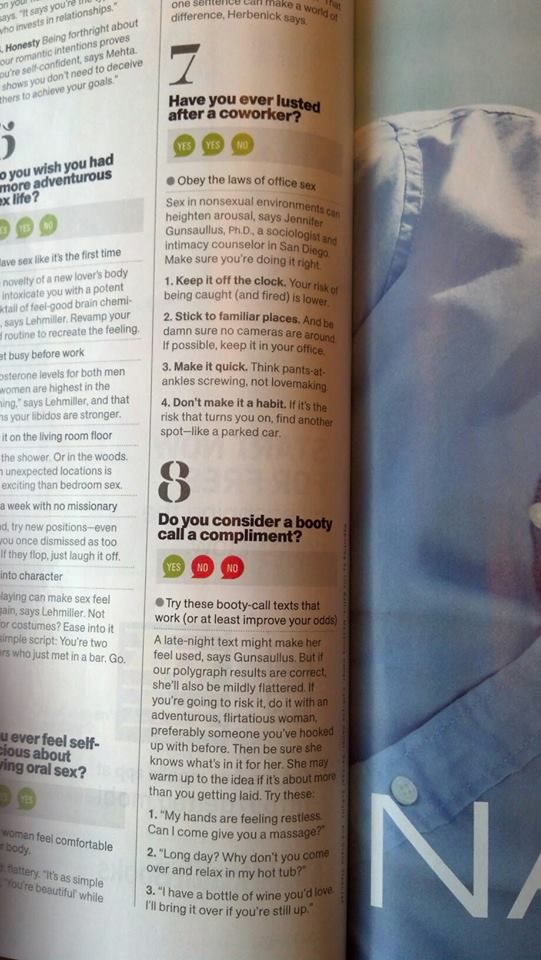Opening the Tiny Hurt Locker - Why Men Need to "Hurt" Their Partners
/I am a new writer for the Relationships, Love + Sex section of the Good Men Project. The Good Men Project's tagline says it all: The conversation no one else is having. I like to think I have a lot of conversations with folks daily about things that don't usually get talked about. So I'm excited to bring my perspectives on sex, intimacy, relationships, gender, and power to the GMP table. Below is my first article with them published today:

It’s necessary to hurt your relationship partner. No, seriously. Think about it this way: it is inevitable that when you come together with another person with different experiences, expectations, beliefs, goals and needs, you will sometimes disagree and disappoint your partner. That can hurt both you and your partner emotionally. But sometimes, that’s necessary. For example, your partner wants to spend the afternoon shopping with you. You agree, although you’d rather poke your eye out with a sharp stick. On Friday night, you assume you’re hanging out with your partner, but then learn she chose to spend time with her friends instead. And the list goes on. These things may seem minor, but they add up over time if you don’t discuss them honestly because they are based on a false compromise.
Some men are afraid to hurt their female partners. I see this in my private practice all the time. Kids are often told by their dads: “don’t ever hurt a woman.” That’s great advice for raising men who respect women. And it’s great to acknowledge that many men do have the power to physically hurt women. Unfortunately, kids don’t have the brain development to grasp the nuanced meaning of social issues. Therefore, by adulthood, this well-intentioned guideline becomes a black and white principle for many men, even around complex emotional situations. If men want to talk about anything that could hurt their partner, they don’t. This is where real problems emerge.
When you don’t express your thoughts or opinions, bad shit starts to happen. Your unspoken truths turn into unspoken resentments. I’ve observed that when people have negative feelings and their feelings go ignored or unprocessed, people behave badly. So in the long run, your initial silence ends up hurting your partner even more. This silence is based partially on fear and guilt: fear of confrontation, fear of feeling horrible for hurting the woman you love, and the guilt over making her cry. That fear and guilt come from a noble and responsible belief system. But it’s imperative to recognize the difference between “small hurts” and “big hurts.” Small hurts, handled responsibly, can avoid big hurts.
Easier said than done though. Let’s say you disagree with your partner’s decision to discipline the kids, but keep your opinions to yourself and become passive aggressive with your resentment. Later on, when your partner is disappointed by your attitude or your lack of support, you avoid taking any responsibility at all, or even lash out because you didn’t feel like you had a choice. However, you did have a choice. You always do.
It all comes down to learning how to acknowledge and sit with the discomfort of hurting your partner. This means building resiliency, including establishing trust in yourself that you can handle your negative feelings, manage seeing disappointment in your partner, and know that you’ll still be loved. It means remembering that you are a good man. It means choosing to acknowledge your discomfort and staying present with it. This is resiliency.

Where do you feel the discomfort inside your body? Is it a gnawing in your gut? A sinking feeling in your stomach? An ache in your chest? Sometimes, clients describe a tightness in their throat when they are afraid to say something. These sensations are so uncomfortable. Most of us probably learned to run, numb or distract ourselves, withdrawing into video games or the Internet, alcohol or eating. Sometimes, we even lash out in anger. But staying present with the pain and facing the discomfort head-on allows for more conscious and authentic interactions that are critical for relationships to thrive.
It is natural, normal, and even healthy to have disagreements. This is all part of the negotiation required to merge two lives. When you choose to acknowledge and negotiate the small hurts honestly and responsibly, you live more from love than fear.
Conscious conversations like this one must include the participation of both partners. It is tough when it’s one-sided, and this could happen if you start speaking your truth in new ways. Over time though, you can model responsible communication and claim ownership of difficult emotions, co-building a relationship where both partners are resilient enough to handle disappointment and move on. If one or both of you lack the skills to communicate in this way, a counselor or therapist, or even a good relationship book, can offer you tools.
I’m reminded of my mother’s framed needlepoint that hung on our living room wall. It read, “A stitch in time saves nine.” The more adept you become at addressing small hurts, the less likely you will need to address the big ones later on.
(Image Credit: Flickr/-Rodrigo Vargas-)
~Dr. Jenn Gunsaullus, San Diego, CA -- Sexologist, Sociologist, Sexuality Speaker




































